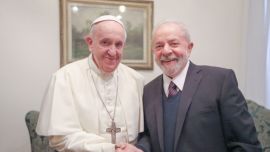The IMF’s latest jumbo loan to Argentina — a serial defaulter now led by a close Donald Trump ally – raised red flags for many of the Fund’s top decision-makers. It got a green light anyway.
About half of the 25 executive board chairs at the International Monetary Fund had serious concerns about the US$20-billion deal, according to people familiar with the matter, who asked not to be identified discussing private matters. The credit will go to a country that’s already by far the Fund’s biggest debtor — gobbling up more than one-third of its entire global lending — and includes an unusually large US$12-billion chunk upfront.
But by the time the board met to discuss approval in Washington, late on April 11, the bailout was essentially a fait accompli. The government of Javier Milei, whom Trump has called his “favourite president,” had unveiled details at a Buenos Aires press conference hours before it was officially approved by the IMF board.
The decision to permit that announcement was approved by the board, according to one of the people — and any programme that gets as far as the IMF’s top decision-making body is all but guaranteed to pass anyway. Still, the out-of-the-ordinary sequencing was just one of many signs that Argentina was granted special treatment. The deal, some felt, was muscled through by the Fund’s management, according to three people familiar with the matter. Some were left with the feeling that the decision was driven more by politics than policy — sowing concern about the precedent that’s been set.
“The programme for Argentina was approved by the executive board following a very rigorous evaluation,” Rodrigo Valdés, the IMF’s Western Hemisphere director, told reporters in Washington when asked about the story. He added that the deal also reflected Argentine “authorities’ very strong track record and commitment to stabilisation.”
Falling short
The backdrop for all this was the global upheaval triggered by Trump, and frazzled nerves around his next move. The US president has ordered a review of US participation in international bodies like the IMF — due in August — which has spurred leaders of the institutions to seek ways they can demonstrate their usefulness to Trump.
At its spring meeting this week, the Fund downplayed its own work on climate change after US Treasury Secretary Scott Bessent criticised the institution for “falling short” of its core role as a lender of last resort and suffering from “mission creep.”
Granted, Argentina under Milei had gone beyond expectations in executing the kind of policies typically prescribed by the IMF, and delivered results. Milei slashed the equivalent of five percent of GDP from the country’s chronic budget deficits, brought monthly inflation that was once well into double digits below three-percent in February — all while bringing poverty down to 38 percent from 53 percent.
Given Argentina’s track record — including two IMF programmes in the last six years that went up in flames — any new one would invite extra scrutiny. In 2025, cash is flowing freely from other Washington-based lenders too. Within minutes of the Fund’s announcement, the World Bank had unveiled US$12 billion in aid and the Inter-American Development Bank offered US$10 billion.
“This time, it’s different,” IMF Managing Director Kristalina Georgieva told a Thursday press conference. “This time, there is decisiveness to put the economy on a sound track,” she said. “Now, the country is not alone. We are there.”
So is the US Treasury secretary. Bessent flew to Argentina days after the IMF loan went through – just his second trip abroad during a spell in office that’s been dominated by global trade war. In Washington this week, Bessent doubled down on support for Milei’s government — first before a private audience Tuesday, where he said the US could offer Argentina a credit line, and then in a Wednesday speech that held up Argentina’s IMF programme as a model to other countries.
“Argentina deserves the IMF’s support because the country is making real progress toward meeting financial benchmarks. But not every country is so deserving,” Bessent said. “The IMF must hold countries accountable for implementing economic reforms. And sometimes, the IMF needs to say ‘no’.”
In the hallways of the Washington lender, some board members didn’t feel they had that option for Argentina. While some floated the idea of abstaining, ultimately countries felt the cost of going against management and the United States would be too high, according to one of the people. To be sure, another source said they didn’t perceive any pressure from management.
‘Up against the wall’
Georgieva convened informal meetings of the executive board chairs — who represent IMF members — in the weeks leading up to the Argentina loan decision. On March 25 they discussed a range of options for the frontloaded portion, ranging between US$8 billion and US$15 billion. Then, at an April 2 lunch — to which they were summoned only the day before — the US$12 billion was disclosed, along with details about the proposed new currency regime. Some of the chairs felt the lunch was an effort by management to convince them to go along, despite their persistent reservations, according to two sources.
Meanwhile, plenty of the details were becoming public, piling extra pressure on the board to live up to what was by then the market’s expectation, three of the people said. Bloomberg broke the news that the sum in consideration was US$20 billion on March 21. Economy Minister Luis Caputo specified the figure on March 27, adding that it was subject to board approval. The IMF confirmed that a day later. Then Caputo said on March 30 that Argentina had requested more than 40 percent of the programme in frontloading. Georgieva called the 40-percent figure “reasonable” in a Reuters interview on March 31. The IMF ended up offering 60 percent.
In Argentina, as the board decision approached – and for all Milei’s impressive economic numbers – a fresh wave of market volatility was building. Investors were in the dark over whether an IMF deal would be accompanied by currency devaluation, and the black-market peso tumbled. Since then, a loosening of currency controls as part of the new IMF plan has passed off relatively smoothly.
“Now everything looks fine, but if you didn’t grant the programme three weeks ago, the economy was up against the wall,” said Eduardo Levy Yeyati, chief economic advisor at Adcap Grupo Financiero, a Buenos Aires brokerage. “Obviously the US supported it. But I think the board also couldn’t find enough reasons to let go of Argentina’s hand, in this global context, and given what the country had done on the fiscal front.”
The US support of the Argentina loan was a departure. It had been consistently abstaining in other decisions, citing procedural reasons, according to multiple people familiar with the matter. The position of undersecretary for international affairs — which typically has the IMF file — is one of many still vacant at Bessent’s Treasury, and Shannon Ding, a career Treasury official, is filling in as a placeholder at the Fund. Yet that late Friday night, Ding supported Argentina’s programme, according to the people.
‘Junior creditor’
The main concern raised by the chairs was the outsize exposure to Argentina the Fund would take on, particularly with such large portion upfront. The nation already owes the Fund US$41 billion, with principal repayments not due to start until mid-2026.
That debt stems from a loan during Trump’s first term — to another pro-market Argentine government, led in that case by a Trump family friend — which remains the biggest in Fund history. It went wrong almost immediately, the latest in a long line of IMF-Argentina debacles. Inflation soared, the peso plunged, capital fled, the economy sank into recession, and voters booted the government out.
A persistent concern that’s surrounded IMF lending ever since is that authorities might blow any funds they’re offered in a defence of the peso. Bessent downplayed that risk in a Bloomberg interview during his recent visit. The large war chest now available to Argentina lessens the chance it would need to intervene to prop up the currency, he said.
Other issues raised by board members include the lack of domestic political support for the programme — Milei signed an executive order rather than securing a majority in Congress — the hurried timeline for its approval, and insufficient conditionalities given the exceptional size of the loan.
There are risks for the lender in handing over so much cash upfront in a programme that’s essentially refinancing large existing debts, according to Brad Setser, a former senior official at the US Treasury.
“The Fund would be raising its exposure when the peso is clearly overvalued and the country is repaying bonds,” he said. “It looks like the Fund is positioning itself as, de facto, the junior creditor.”
related news
by Manuela Tobias & Eric Martin, Bloomberg

























Comments